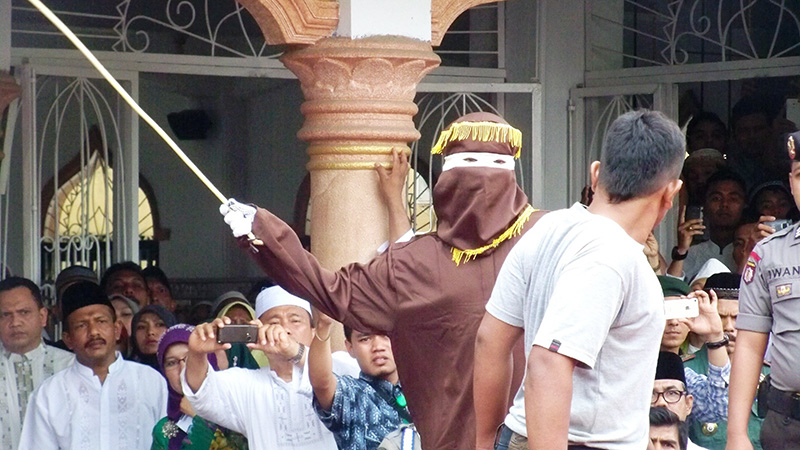Gay Teacher Fired by Catholic School Loses Lawsuit
Federal judge rules religious schools are allowed to discriminate in hiring based on their religious values under the First Amendment.

A federal appeals court has ruled against a Catholic school teacher in New York who was fired after revealing he was gay and intended to marry his boyfriend, in a ruling that solidifies the right of religious schools to discriminate in who they hire under the First Amendment.
Cody Butler, the plaintiff in the cases, applied for a faculty position teaching English and social studies at St. Stanislaus Kostka Catholic Academy in Queens back in 2015. In his application letter, he said that teaching at the school would be “a way of enacting my faith, to teach in a Catholic setting.”
Butler interviewed for the job and was hired in August 2015. But after attending an orientation session for new teachers on Sept. 1, Butler objected to some of the remarks made during the session and wrote a letter to the school’s principal expressing his concerns, reports Gay City News.
“I am concerned about my position within the diocese and school. The tones of the speakers were strident at times and I cannot tell if I would be accepted. I am homosexual and plan on marrying my boyfriend eventually, and after being told all day that I have to live church doctrine I feel wounded and unwanted,” Butler wrote. “I am concerned. I want to teach the kids at St. Stan’s more than anything, but I put the decision in your hands now rather than at some point down the line. Would I still be a welcome member of the St. Stan’s community?”
According to court documents, the school’s principal then forwarded the email to the superintendent of the Brooklyn Diocese, asking for advice, due to Catholic Church teaching stating that marriage is only between one man and one woman. The principal noted that teachers at St. Stan’s are expected to live out their religious and moral values in their everyday lives and through example — creating a conflict with Butler’s stated intention of entering a same-sex marriage.
On the following day, the principal sent Butler a letter canceling his contract. But Butler did not receive the letter in time, and showed up to the first day of classes. He was handed a copy of the termination letter and told he was dismissed, while the school hired another applicant to teach his classes.
Butler filed a discrimination complaint against the school and the Diocese of Brooklyn with the New York City Human Rights Commission. In response to that complaint, the school responded that Butler’s termination was based on his “statement of intended conduct,” rather than his sexual orientation. St. Stan’s said that Butler’s “choice to marry another man is a clear and obvious violation of Church teachings” and that “if [Butler] was living a celibate life, his sexual orientation would be meaningless absent more actions on his part.”
In June 2019, Butler filed a federal lawsuit alleging discrimination, in violation of his rights under Title VII of the Civil Rights Act of 1964, New York State nondiscrimination law, and New York City’s nondiscrimination law. At the time he filed his suit, the 2nd U.S. Circuit Court of Appeals had ruled that Title VII’s prohibitions on sex-based discrimination apply to instances of discrimination based on sexual orientation. The U.S. Supreme Court ruled similarly in a 2020 decision, finding that anti-LGBTQ discrimination in employment is prohibited under the Civil Rights Act.
Unfortunately for Butler, last month, on June 28, U.S. District Judge Eric Komitee, of the U.S. District Court for the Eastern District of New York, ruled that St. Stan’s, and the Brooklyn Diocese, are exempt from Title VII and state and local nondiscrimination laws under the First Amendment’s Free Exercise Clause.
Under the First Amendment, religious entities are exempt from liability under Title VII when they hire or fire “ministerial employees,” whose job is to fulfill the “ministry” of the organizations. This concept, known as the “ministerial exception,” allows religious entities to discriminate based on their religious beliefs. Many courts have previously found in favor of this principle.
In Butler’s case, that means he could be fired because his stated intent of entering a same-sex marriage runs counter to the religious values espoused by the Catholic Church. The contract Butler signed and the school handbook make it clear that teachers at St. Stan’s are expected to emulate Catholic values in their personal lives, and both documents state that teachers may be terminated if they are found to have violated “the tenets of Catholic morality or teaching contrary to Catholic doctrine.”
Komitee noted in his opinion that the principal had testified that teachers at St. Stan’s are expected to “incorporate” Catholic values into their classroom lessons, even in non-religious classes. St. Stan’s also sent all new teachers a letter reiterating that each employee, regardless of subject matter, would “play a vital role in advancing the mission of the Catholic Church” and would bear “the awesome responsibility of bringing the Gospel message to the students.”
But Komitee went further, invoking a “church autonomy principle,” or the concept that the government may not interfere with church policies that are based on religious doctrine.
“That principle is broader than the ministerial exception,” he wrote, and applies in cases where the defendant “has proffered a religious reason for termination.” In other words, Butler’s insistence on his right not to comply with the school’s requirement that teachers live their lives according to Catholic doctrine, and even flout that by marrying his boyfriend — and not simply his sexual orientation — were enough to justify his termination.
“The bottom line is that courts have long recognized the church-autonomy doctrine, and no binding authority has ever said that the ministerial exception eclipses this doctrine in employment-discrimination cases,” Komitee wrote. “Given the case law discussed above, I am constrained to conclude that no such limitation exists. Under controlling case law, the church autonomy doctrine applies in the employment-discrimination context, as it does elsewhere. And this principle forecloses judicial inquiry into the plausibility of St. Stans’ asserted religious justifications in this case.”
Because he dismissed Butler’s Title VII claims — the only aspect of the car that alleges violations of federal law — Komitee declined to exercise jurisdiction over Butler’s state and local law claims, dismissing them as well.
Butler’s lawyers, with the New York City-based law firm of Outten & Golden, told Gay City News they are planning to appeal the cases to the 2nd U.S. Circuit Court of Appeals.
Support Metro Weekly’s Journalism
These are challenging times for news organizations. And yet it’s crucial we stay active and provide vital resources and information to both our local readers and the world. So won’t you please take a moment and consider supporting Metro Weekly with a membership? For as little as $5 a month, you can help ensure Metro Weekly magazine and MetroWeekly.com remain free, viable resources as we provide the best, most diverse, culturally-resonant LGBTQ coverage in both the D.C. region and around the world. Memberships come with exclusive perks and discounts, your own personal digital delivery of each week’s magazine (and an archive), access to our Member's Lounge when it launches this fall, and exclusive members-only items like Metro Weekly Membership Mugs and Tote Bags! Check out all our membership levels here and please join us today!



























You must be logged in to post a comment.